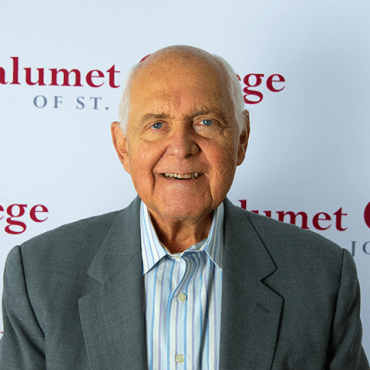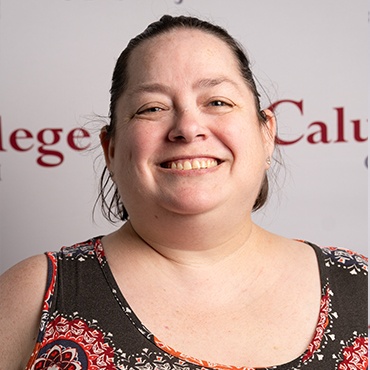
Neuroscience
CALUMET COLLEGE OF ST. JOSEPH'S NEUROSCIENCE PROGRAM SUPPORTS YOUR DREAM OF HAVING AN IMPACT THROUGH SCIENCE
The Bachelor of Science in Neuroscience program offers a comprehensive education in the foundations of neuroscience, preparing you for an exciting and growing field that is having a tremendous impact in the world of research, biotechnology and medicine.
The brain is complex and opens up vast research opportunities. There exist many opportunities to unravel the brain’s activities, which could help answer an almost endless number of mysteries surrounding how it works. At the biological level, there are questions about how clusters of brain cells firing across neural networks regulate the body’s systems and produce complex behavior. At a psychological level, scientists can study how the biological and chemical systems of the brain impact human behavior in a social structure. Many research options exist leading to potential better life for people.
In the Neuroscience Program, you will be able to:
- Explain a wide range of neurological phenomena, including behavior, the senses, movement, emotions and a range of disorders
- Combine understanding from psychology, biology and neuroscience to explain the phenomenon of cognition
- Describe both historical and modern approaches to neuroscience and psychiatry
Request Information
Program Highlights
Over 98% Employment Rate
The job outlook for Neuroscience graduates is bright, with a 98% employment rate and jobs in every state.
Pursue a wide range of lucrative careers
Many Neuroscience grads earn more than twice the average American yearly income as engineers, medical writers, scientists, psychologists, marketing and more.
Hybrid Learning Options
Some courses in this program are taken online & powered by Rize. The core curriculum will be taken on-campus, giving students the best of student life with the flexibility of some online learning.
Program Overview
Career Options
& Average Salaries
Career Options with this major include but are not limited to:
- Pharmaceutical Sciences Manager ($80,435)
- Research Scientist ($87,624)
- Clinical Psychologist ($96,196)
- Medical Writer ($99,282)
- Neurosurgeon ($126,273)
- Biostatistician ($131,234)
- Neurologist ($234,951)
In addition, students may pursue Neuroscience to prepare for graduate or medical school.

Delivered in Partnership with Rize Education
Our Neuroscience curriculum was built with the support of four key members of the National Neuroscience Curriculum Initiative, whose names and backgrounds are listed below in the contributors section. The NNCI is a collaboration between educators and neuroscientists that seeks to make core concepts in neuroscience available to a broader audience. To accomplish this, they have developed engaging and interactive exercises for teaching in the classroom through a peer-review process. Their overarching aim is to create, pilot, and disseminate a comprehensive set of shared resources in the field of neuroscience.
Thanks to the help of our academic contributors, we have been able to layer a significant amount of NNCI content into a more traditional undergraduate neuroscience curriculum, providing students with a much deeper understanding of the brain. This is especially true of the fourth neuroscience course, Clinical Neuropathology, which is based heavily on the NNCI Quarantine Curriculum, adapted to an undergraduate audience.
As is typical for neuroscience, this program places a strong emphasis on biology and psychology coursework in addition to focused neuroscience courses. This program covers some – but not all – premedical requirements. Students who wish to go to medical school must also take one year of physics, one year of organic chemistry, calculus and select Biochemistry I as one of their electives, for a total of 20 additional credit hours.
MEET THE EXPERTS AND ADVISORS
Dr. David Ross, Subject Matter Expert
Dr. David Ross is an Associate Professor of Psychiatry at the Yale School of Medicine and Associate Program Director of the Yale Adult Psychiatry Residency. He is a Co-Founder and Co-Chair of the National Neuroscience Curriculum Initiative. Dr. Ross holds an MD and Ph.D, from Yale and has won numerous awards within the fields of neuroscience and psychiatry.
Dr. Adriane dela Cruz, Subject Matter Expert
Dr. Adriane dela Cruz is an Assistant Professor of Psychiatry at University of Texas Southwestern. She completed her undergraduate training at Amherst College, where she earned her B.A. in neuroscience magna cum laude. She completed her M.D. and Ph.D. in neuroscience at the University of Texas. Her interests include research and practice in addiction psychiatry and psychiatric education at the medical student, resident, and fellow level with a focus on neuroscience and evidence-based medicine.
Dr. Ashley Walker, Subject Matter Expert
Dr. Ashley Walker is an Associate Professor of Psychiatry and the Residency Training Director at the University of Oklahoma School of Community Medicine in Tulsa. She completed her undergraduate degree in psychology and mathematics at Rice University, medical school at the University of Texas Southwestern and psychiatry residency at the OU School of Community Medicine. Her interests include psychiatric education, physician well-being, treatment of severe mental illness, and eliminating racism and mental health stigma.
Dr. Joseph J Cooper, Subject Matter Expert
Dr. Joseph J Cooper serves as Associate Professor of Clinical Psychiatry, Director of Undergraduate Medical Education in Psychiatry, and Co-Director of the Behavioral Neurology and Neuropsychiatry Fellowship at the University of Illinois at Chicago. He completed his undergraduate degree at Johns Hopkins University, medical school at the University of Chicago, and fellowship in Behavioral Neurology and Neuropsychiatry at Northwestern University. His interests include education in neuroscience, neuropsychiatry, and neuromodulation.
Frequently Asked Questions
Although not every job opportunity available to Neuroscience grads requires a degree, the vast majority of them do, and it will probably help you get hired. When you earn a Bachelor’s of Science in Neuroscience, you may have an advantage in both earning potential and salary. People with a bachelor’s degree also have a 50% lower rate of unemployment, and on average they make an additional $630,000 to $900,000 over their lifetime—even more in high-growth fields like supply chain!
Yes! We want to ensure our program teaches you the skills you need to get hired and work through real-world problems that matter. The best way to do that is to partner with the people and companies who are actually doing it. Our collaboration with Fortune 500 companies and subject matter experts means their multi-billion-dollar expertise is reflected in everything you’ll study here.
That’s really up to you! Neuroscience is a big field, so you’ll have lots of options. If you like the idea of working in brain research, you may wish to pursue a career as a neuroscientist. If you’ve always been drawn toward helping others, you may want to work towards being a therapist or a medical doctor (this program is an excellent degree path for pre-meds!). As a Neuroscience grad, the high-paying possibilities available to you across industries are essentially endless.
Although working as a neuroscientist is an excellent option for graduates, many will pursue alternative paths, including being a therapist, lab technician or medical doctor, to name a few. No matter what you choose, this major will leave you with many fantastic, lucrative options!
This major may be right for you if you enjoy learning about the human brain, have a burning curiosity for how things work, are looking for a degree that opens a ton of doors to different high-growth careers, want to have a job that never gets boring and want to gain a skill set that makes you more and more valuable as your career progresses.
This concentration is part of an exclusive partnership between Calumet College of St. Joseph and Rize Education, which means you’ll be learning with students from your campus, as well as students from a selective consortium of schools across the country. The goal is to help you build a national network of people in your industry before graduating.
Faculty
Ahmed Lakhani, Ph.D.
Daniel Stroik, Ph.D.
David Harnish, M.L.I.S.
Joseph Kovach, Psy.D.
Maria Arizzi, Ph.D.
Program
Objectives and requirements
Upon completion of this program, it is expected that students will:
- Understand the structure and function of the nervous system in humans
- Describe the organization of the nervous system and its components
- Understand cellular and molecular neurobiology
- Explain how the senses function
- Understand the biological basis of consciousness and movement
- Explain the effect of various disorders and diseases on a range of neurological systems
- Understand the structure and function of the nervous system in humans
- Understand a range of modern topics and issues in Neuroscience and Psychiatry
- Discuss current problems in psychiatric neuroscience
120 credit hours
The following courses are required for a baccalaureate degree:
38 hours: General Education
BIOL 115 Cell and Evolution (Lecture, Lab, Supplemental)
or CHEM 200 General and Analytic Chemistry I (Lecture, Lab, Supplemental)
MATH 104 PrecalculusPSY 100 Introduction to Psychology
56 hours: Program Requirements
BIOL 115 Cell and Evolution (Lecture, Lab, Supplemental)
or CHEM 200 General and Analytic Chemistry I (Lecture, Lab, Supplemental)
BIOL 205 Development, Structure and Evolution (Lecture, Lab, Supplemental)
BIOL 230 Microbiology (Lecture, Lab)
BIOL 300 Human Anatomy and Physiology I (Lecture, Lab)
BIOL 315 Mendelian and Molecular Genetics (Lecture, Lab)
CHEM 205 General Chemistry II (Lecture, Lab, Supplemental)
CHEM 310 Organic Chemistry I (Lecture, Lab)
CHEM 311 Organic Chemistry II (Lecture, Lab)
PSY 210 Research Methodology
PSY 230 Statistics for Behavioral Sciences
PSY 320 Social Psychology
PSY 335 Abnormal Psychology
PSY 340 Developmental Psychology
PSY 345 Industrial Organizational Psychology
PSY 351 Brain and Behavior
PSY 352 Drugs and Behavior
12 hours: Neuroscience Core through RIZE (these courses by RIZE will be online)
NSM 300 Foundations of Neuroscience
NSM 301 Biological Basis of Perception & Movement
NSM 302 Cognitive Neuroscience
NSM 303 Clinical Neuropathology
14 hours: Electives
Suggested electives:
BIOL 305 Human Anatomy and Physiology II (Lecture, Lab)
CHEM 320 Biochemistry (Lecture, Lab)
HSV 200 Introduction to Drugs and Alcohol
You Belong
at Calumet College of St. Joseph!







